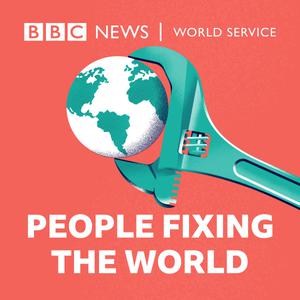
People Fixing the World
BBC World Service
Brilliant solutions to the world’s problems. We meet people with ideas to make the world a better place and investigate whether they work.
- 1 minute 37 secondsWe're coming back for 2025!
A quick hello and happy new year from Myra and a preview of some of the great solutions coming up on People Fixing The World. Share our podcast with your friends and family and give them something to cheer about as we look ahead to 2025.
People Fixing The World from the BBC is about brilliant solutions to the world's problems. We'd love you to let us know what you think and to hear about your own solutions. You can contact us on WhatsApp by messaging +44 8000 321721 or email [email protected]. And please leave us a review on your chosen podcast provider.
21 January 2025, 1:00 am - 22 minutes 58 secondsRestoring nature for all
Myra Anubi visits a major project in the north of England that’s restoring a damaged landscape. Haweswater in the Lake District is an area of stunning natural beauty but over the years it’s been degraded by humans and livestock. This has created flood risks and reduced biodiversity. But now work is underway to restore the site to benefit both people and the environment. Rivers have been ‘re-wiggled’, peat bogs repaired, and new trees planted. Myra also visits an innovative scheme in the area that’s using old Christmas trees to repair damaged river banks.
People Fixing The World from the BBC is about brilliant solutions to the world's problems. We'd love you to let us know what you think and to hear about your own solutions. You can contact us on WhatsApp by messaging +44 8000 321721 or email [email protected]. And please leave us a review on your chosen podcast provider.
Presenter: Myra Anubi Producer: Richard Kenny Editor: Jon Bithrey Sound mix: Gareth Jones
(Image: Annabel Rushton and Glen Swainson of the RSPB with Myra Anubi, BBC)
31 December 2024, 1:00 am - 22 minutes 59 secondsOur favourite solutions
Presenter Myra Anubi and the team chat about some of their favourite projects that have been covered on People Fixing The World over the last twelve months.
We’ll be returning to Thailand and the school run by kids; checking in with a family of beavers which are part of an urban rewilding project in the UK and hear more about saving kelp forests in California and healthcare solutions that are really making a difference in Kenya.
People Fixing The World from the BBC is about brilliant solutions to the world's problems. We'd love you to let us know what you think and to hear about your own solutions. You can contact us on WhatsApp by messaging +44 8000 321721 or email [email protected]. And please leave us a review on your chosen podcast provider.
Presenter: Myra Anubi Reporters: Claire Bates, Claire Bowes, Craig Langran, William Kremer Producer: Katie Solleveld Editor: Jon Bithrey Sound mix: Gareth Jones
(Image: Myra in the studio, BBC)
24 December 2024, 1:00 am - 22 minutes 57 secondsThe cows fighting wildfires
This summer, deadly wildfires raged in countries like Spain, Canada, and Greece. And as the earth warms up, they’re becoming increasingly common and harder to deal with. Today, we will hear about a special herd of cows which are helping to keep some of the flames under control. And we find out how cutting edge space technology could be used to quickly detect forest fires when they break out.
People Fixing The World from the BBC is about brilliant solutions to the world's problems. We'd love you to let us know what you think and to hear about your own solutions. You can contact us on WhatsApp by messaging +44 8000 321721 or email [email protected]. And please leave us a review on your chosen podcast provider.
Presenter: Myra Anubi Reporter/producer: Craig Langran Sound mix: Annie Gardiner Editor: Jon Bithrey
17 December 2024, 1:00 am - 23 minutes 37 secondsReducing gun violence
The misuse of guns is a problem for lots of countries across the world. This week we look at projects trying to reduce deaths and injuries.
In the US we visit the company which says it has successfully developed the world’s first ‘smart gun’ which uses facial recognition and fingerprints to identify the gun owner - meaning only they can fire the gun. We also speak to a woman who’s convinced police in the UK to speak to the partners of those being issued gun licences.
And in Jamaica - where most murders involve firearms - we find out how hospital data is being used to reduce the number of attacks using guns - even in the country’s most troubled neighbourhoods.
People Fixing The World from the BBC is about brilliant solutions to the world's problems. We'd love you to let us know what you think and to hear about your own solutions. You can contact us on WhatsApp by messaging +44 8000 321721 or email [email protected]. And please leave us a review on your chosen podcast provider.
Presenter: Myra Anubi Reporters: Claire Bowes, Nick Davies, Anthony Wallace Producer: Claire Bowes Sound mix: Andrew Mills Editor: Jon Bithrey
(Image: Mourners remember those killed in 2024 Apalachee school shooting, US, Getty Images)
10 December 2024, 1:00 am - 23 minutes 1 secondCleaning up India's streets
The world produces about 400 million tonnes of plastic waste annually. A lot of this waste, such as multi-layered plastic packaging and cigarette butts, is hard to recycle. Instead, it fills up landfills and contaminates the environment.
We travel to the Indian city of Pune where eco-social company Recharkha upcycles plastic packaging waste into contemporary products like tote bags, lampshades and table mats. It relies on village women’s handicraft using traditional spinning wheels or charkhas, simultaneously helping tackle rural unemployment.
We also head to another Indian city, Noida, where an organisation works with local women to safely turn millions of cigarette butts into clean fluffy material to be used in stuffed toys - among other products.
People Fixing The World from the BBC is about brilliant solutions to the world's problems. We'd love you to let us know what you think and to hear about your own solutions. You can contact us on WhatsApp by messaging +44 8000 321721 or email [email protected]. And please leave us a review on your chosen podcast provider.
Presenter: Myra Anubi Producer/reporter: Chhavi Sachdev Sound mix: Andrew Mills/Ardila Syakriah Editor: Jon Bithrey
(Image: Women who work at the Recharka project, Recharka)
3 December 2024, 1:00 am - 23 minutes 14 secondsCoconuts fixing the world
We eat millions of tonnes of coconuts every year - with the dense white flesh of the fruit making a tasty snack and the juice a refreshing drink.
But the inedible husk and shell go to waste – and it’s this part that innovators and entrepreneurs around the world are now putting to work to solve a whole host of problems.
In Sierra Leone, a personal tragedy was the catalyst for young entrepreneur Alhaji Siraj Bah to start a business which takes the coconut husk and turns it into an alternative to charcoal - which is good for the forests and could potentially save lives too.
And we hear about the start-up using coconut to keep fish, fruit and vegetables cool for longer without using any plastic.
People Fixing The World from the BBC is about brilliant solutions to the world's problems. We'd love you to let us know what you think and to hear about your own solutions. You can contact us on WhatsApp by messaging +44 8000 321721 or email [email protected]. And please leave us a review on your chosen podcast provider.
Presenter: Myra Anubi Reporters: Eric Mugaju Producer: Craig Langran Series producer: Tom Colls
(Photo: Farmers in Teluk Payo village, south Sumatra are peeling the skin of coconuts to be turned into copra or charcoal, 13 July, 2022. Credit: Sigit Prasetya/Getty Images)
26 November 2024, 1:00 am - 22 minutes 58 secondsSorting extreme waste
We rely on space for our communications, weather monitoring and security. Yet rising levels of space junk increase the risk of collisions, putting these things at risk.
This week we are heading to a space lab in the UK to meet the scientists building a special waste collector that will clean up defunct satellites. We’ll also be heading to the Himalayas to see how an innovative project is training sherpas in Nepal to clear trash off the mountains using drones.
People Fixing The World from the BBC is about brilliant solutions to the world's problems. We'd love you to let us know what you think and to hear about your own solutions. You can contact us on WhatsApp by messaging +44 8000 321721 or email [email protected]. And please leave us a review on your chosen podcast provider.
Presenter: Myra Anubi Producer: Claire Bates Sound mix: Annie Gardiner Voiceovers: Diwakar Pyakurel at BBC Nepali, Hikmat Khadka Editor: Jon Bithrey
(Image: Myra Anubi and Anna Nash from Astroscale, BBC)
19 November 2024, 1:00 am - 23 minutes 3 secondsA wheelchair that learns
Powered chairs offer people with limited mobility the chance to be independent, since they can be controlled with an array of switches and pads. For some people though, unpredictable muscle spasms mean that driving can be time-consuming, stressful or dangerous. We try out a new device from Belgium that uses artificial intelligence to quickly learn a user’s profile, filtering out unintentional movements to provide a smooth experience, meaning more people than ever can steer their chairs and live more comfortably. And we find out how clothing can help autistic people communicate their feelings more easily.
People Fixing The World from the BBC is about brilliant solutions to the world's problems. We'd love you to let us know what you think and to hear about your own solutions. You can contact us on WhatsApp by messaging +44 8000 321721 or email [email protected]. And please leave us a review on your chosen podcast provider.
Presenter: Myra Anubi Producer/reporter: William Kremer Reporter: Ben Morris Editor: Jon Bithrey
(Image: Levi Rijsbrack and Ben Morris, William Kremer/BBC)
12 November 2024, 1:00 am - 22 minutes 58 secondsThe race to save Madagascar's biodiversity
Madagascar is the second-largest island nation in the world, similar in size to France or Texas. Lying off the coast of southern Africa, it’s home to nearly 30 million people and is a real biodiversity hotspot. Nearly 90 percent of its plants and animal species are endemic, meaning they can’t be found anywhere else in the world. But much of the habitat they depend on is being destroyed, both on land and at sea. On this programme we look at how local communities are fighting to protect their forests and the marine life that that surrounds this unique place.
People Fixing The World from the BBC is about brilliant solutions to the world's problems. We'd love you to let us know what you think and to hear about your own solutions. You can contact us on WhatsApp by messaging +44 8000 321721 or email [email protected]. And please leave us a review on your chosen podcast provider.
Presenter: Myra Anubi Reporter: Sira Thierij Sound Mix: Hal Haines Editor: Jon Bithrey
(Image: Diver off the Barren Isles, Madagascar, credit Sira Thierij)
This podcast was partially funded by the European Journalism Centre, through the Solutions Journalism Accelerator.
5 November 2024, 1:00 am - 22 minutes 59 secondsThe jails where they do things differently
In 2019 a group of prison officers from Philadelphia in the US spent three weeks working in jails across Scandinavia - in order to see whether their more humane approach to custody could work back at home.
Five years on we visit SCI Chester’s ‘Little Scandinavia' to see whether the ‘homely’ environment - where prisoners can order groceries, cook their own meals and socialise with officers – leads to better behaviour.
We’ll also head to Panama, where an innovative recycling project is cleaning up a prison and providing inmates with skills they can use once back in the outside world.
People Fixing The World from the BBC is about brilliant solutions to the world's problems. We'd love you to let us know what you think and to hear about your own solutions. You can contact us on WhatsApp by messaging +44 8000 321721 or email [email protected]. And please leave us a review on your chosen podcast provider.
Presenter: Myra Anubi Producer: Craig Langran Reporters: Jane Chambers, Ben Wyatt Editor: Jon Bithrey
(Image: Inmates playing chess at Chester jail, Pennsylvania, Getty Images)
29 October 2024, 1:00 am - More Episodes? Get the App
Your feedback is valuable to us. Should you encounter any bugs, glitches, lack of functionality or other problems, please email us on [email protected] or join Moon.FM Telegram Group where you can talk directly to the dev team who are happy to answer any queries.
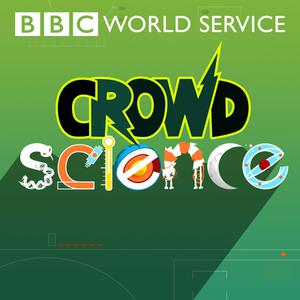 CrowdScience
CrowdScience
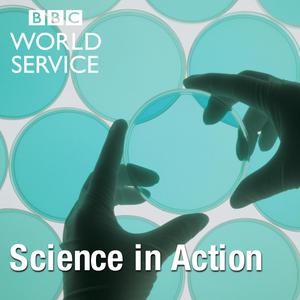 Science In Action
Science In Action
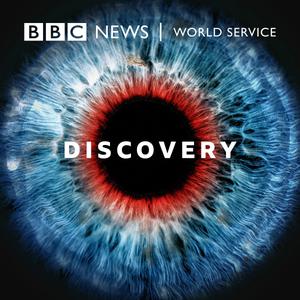 Discovery
Discovery
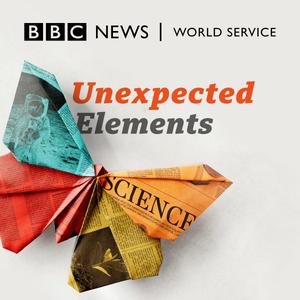 Unexpected Elements
Unexpected Elements
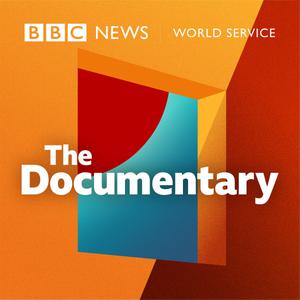 The Documentary Podcast
The Documentary Podcast
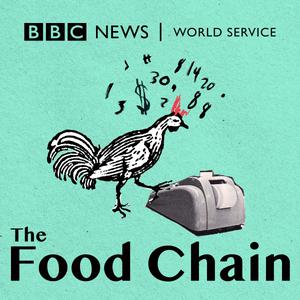 The Food Chain
The Food Chain